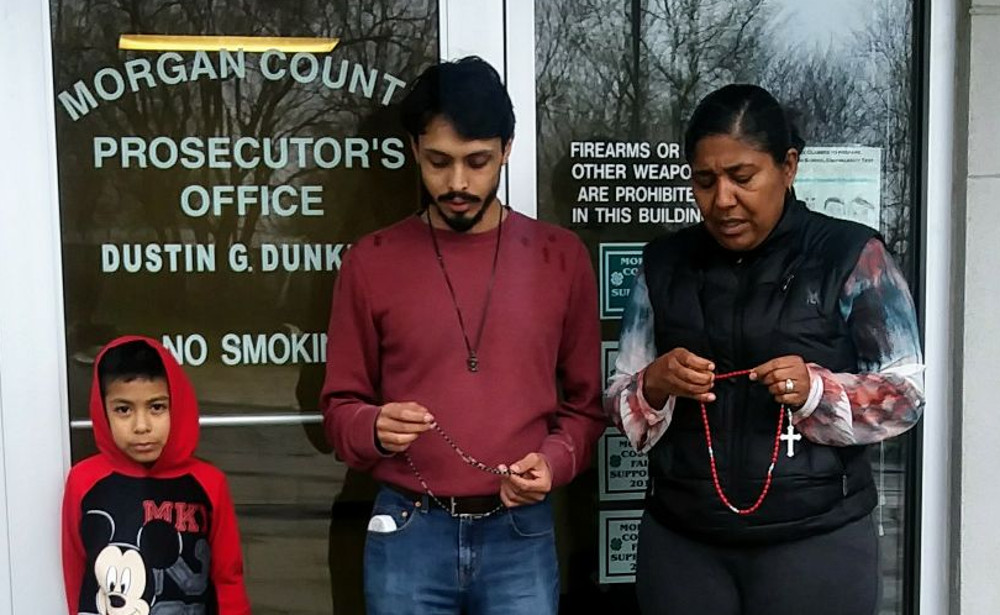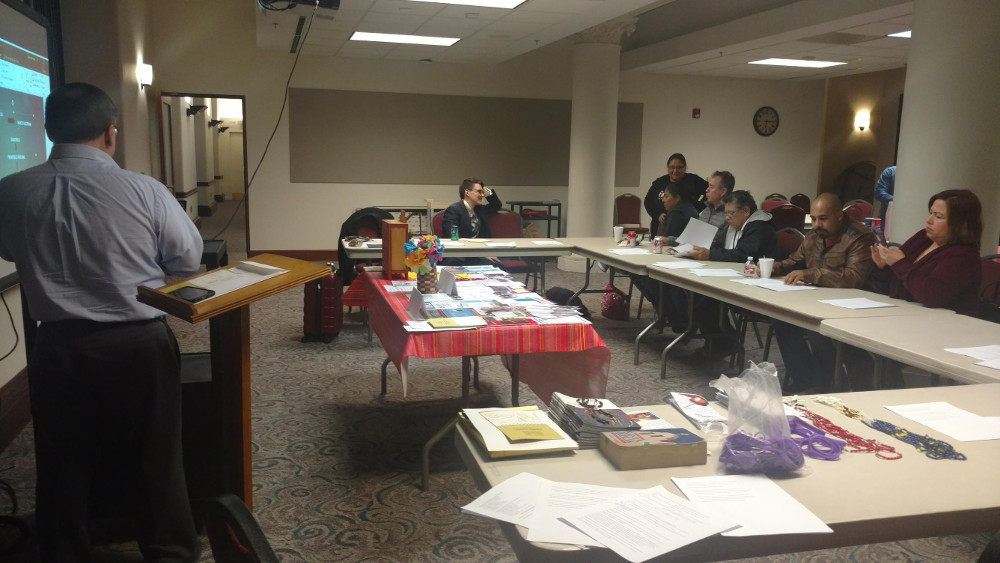
Trinidad Molina and Raiza Guevara pray outside a migrant detention center near Versailles, Missouri, April 22 with the 6-year-old son of Crecencio Mendez-Ramirez, a detained immigrant and father of four. (Courtesy of Diocese of Kansas City-St. Joseph/Trinidad Molina)
At a time when many Catholics born in the United States are leaving the church, immigrants can be considered "reinforcements from the south" sent by God to bring "more faith, more life, more culture, more energy, more sabor, more flavor," said Miguel Salazar, director of Hispanic ministry for the Diocese of Kansas City-St. Joseph, Missouri.
The expansion of Pastoral Migratoria, a program that trains lay immigrant leaders to serve their fellow migrants, is an effort to ensure these "reinforcements" are welcomed. It also integrates Catholic social teaching with local realities and strives to promote the "new evangelization" through care for immigrants.
"Stuff like Pastoral Migratoria, for me, is so important to get leaders built now to help welcome Latinos into the church so we don't miss this grace as it flies by, right through our fingers," said Salazar, who helped bring the program to the diocese.
Pastoral Migratoria began in 2008 in the Chicago Archdiocese after Congress' failed efforts to pass comprehensive immigration reform left the immigrant community disappointed and uncertain.
Immigrants asked two questions, said Elena Segura, senior coordinator of immigration for the Chicago Archdiocese: "What is God telling us, now that immigration reform did not pass and we have to live in a state of uncertainty?" and "Do we have to wait for our American brothers and sisters to help us, to do something for us, or could we do something for each other?"
Pastoral Migratoria, based on the 2007 Aparecida document from the Latin American bishops' council — which included the future Pope Francis, then-Cardinal Jorge Bergoglio — answered those questions by creating a comprehensive program to support migrants.
In the program, lay leaders are taught how to apply Catholic social teaching to local issues before being officially commissioned and sent out to implement the three components of the program: service, justice and accompaniment.
Supporting immigrants was nothing new for Raiza Guevara, a U.S. citizen born in Venezuela. One of nine recently commissioned "pastoral agents" who make up the program's first class in the Kansas City-St. Joseph Diocese, Guevara was moved to be recognized as a leader by the church and connect that service with her faith.
"I wasn't prepared for that," Guevara said of the commissioning ceremony held in the Cathedral of the Immaculate Conception in Kansas City March 3. When the priest was "reading all of the commitments where we promised we would be helping people, it was just very emotional for me because I always had the commitment, but I never promised God that I would do those things."

Immigrant lay leaders from the Diocese of Kansas City-St. Joseph participate in a formation night with Marco Lopez of Pastoral Migratoria Chicago Feb. 28. (Courtesy of Diocese of Kansas City-St. Joseph/Trinidad Molina)
The connection between faith and concrete service and the program's potential to comprehensively care for migrants' needs was one of the main draws for the Kansas City-St. Joseph Diocese to implement the program, said Salazar. He said this model makes sense because migrants' immigration status is often at the center of the issues they face.
The model is also flexible, Segura said. While the program started in one parish in Chicago, it now serves not only 15 Latino parishes in that city, but also six Polish parishes and has been able to expand to other dioceses where the issues immigrants face are very different. Recently, the more rural Diocese of Stockton, California, has begun the formation process with 30 lay leaders.
Like in Chicago, the impetus for starting the program in Kansas City was a time of crisis for immigrants, specifically the 2016 presidential election, which brought increased fear, anxiety and even mental health issues, said Salazar.
Compared to when she moved here in 1995, the climate for migrants has become toxic, Guevara said. When she was a recent arrival, she never felt discriminated against or had anyone tell her to go back home.
"I never felt the pressure that I will be held by immigration or anything," she said. "Now, people even fear when they go to work; that's what I hear every day when people talk to me. They go to work and they don't know if they'll come back."
This climate can sometimes be mirrored in the church, where immigrants are experienced as a challenge because of differences in economic status, race, language and even worship style, said Salazar.
Trinidad Molina has experienced the issue on a personal level. Molina coordinates immigration and refugee services for the Kansas City-St. Joseph Diocese's Human Rights Office and is also involved in implementing Pastoral Migratoria.
In March 2016, during a visit to a parish in nearby Johnson County, Kansas, "someone took a picture of me and they sent it to the FBI and said I was a terrorist," said Molina, who is half Latino and half Bengali. "I was never under real suspicion, but I realized OK, we have a real problem in our area."
"The question is, are people going to get used to learning how to have these conversations they don't want to have?" Molina said later. "And that includes even between sometimes one immigrant group to another immigrant group that don't always get along. We all have to keep expanding our awareness."
Building solidarity and resiliency within the Latino community is the first step in this process. It gives Latinos "a place to stand," from which they can relate to other groups, said Salazar.
He also pointed out that the church's service to Latinos through programs like Pastoral Migratoria is a way of evangelizing.
"It's a work of evangelization for the families that are in need of help, when they think back on this. … Like in the early church when the Romans saw the Christians and said, 'See how they love each other? See how they help each other?' " he said. But Pastoral Migratoria is also a work of evangelization for community partners who might be surprised that Catholics are dedicated to helping immigrants, Salazar added.
Advertisement
Pastoral Migratoria could also touch non-Latino Catholics who want to become involved, said Salazar, pointing out that the program's focus on ministering to Latino families can resonate more broadly than the Latino community; many who witnessed the Kansas City commissioning ceremony asked how they could become involved.
That sense of solidarity and integration will be essential to the future of the church in the U.S., Salazar said.
"It's a real prophetic moment for us in the United States right now. Are we going to accept this grace? Are we going to accept the reinforcements? Are we going to integrate the Latino community hand in hand, not as masters and slaves, not as one superior to the other, but as real amigos, friends, brothers?" asked Salazar.
"That's the real challenge. And it's honestly really not happening. … The fact it's not happening gives me energy to keep going."
[Maria Benevento is an NCR Bertelsen intern. Her email address is mbenevento@ncronline.org.]








